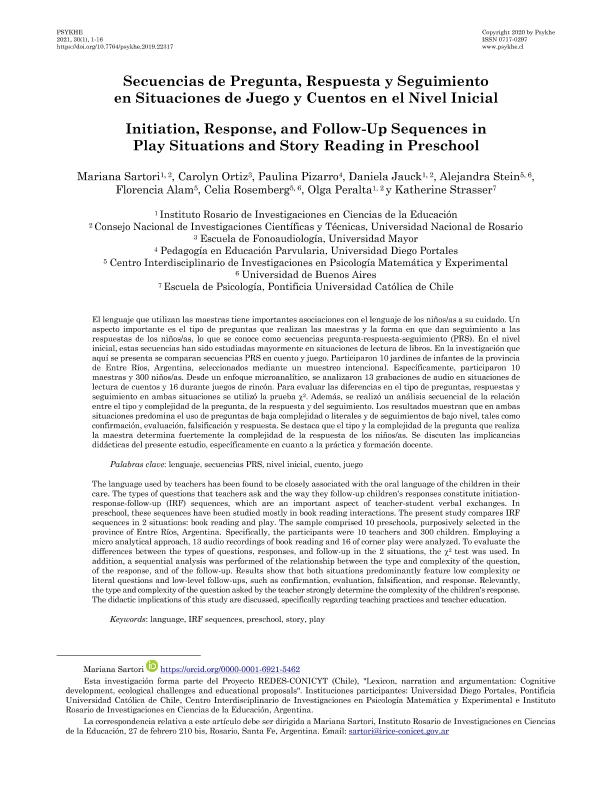Mostrar el registro sencillo del ítem
dc.contributor.author
Sartori, Mariana

dc.contributor.author
Ortiz, Carolyn
dc.contributor.author
Jauck, Daniela Eva

dc.contributor.author
Stein, Alejandra

dc.contributor.author
Peralta, Olga Alicia

dc.contributor.author
Strasser, Katherine
dc.contributor.author
Alam, Florencia

dc.contributor.author
Rosemberg, Celia Renata

dc.date.available
2022-08-04T01:10:32Z
dc.date.issued
2021-06
dc.identifier.citation
Sartori, Mariana; Ortiz, Carolyn; Jauck, Daniela Eva; Stein, Alejandra; Peralta, Olga Alicia; et al.; Secuencias de pregunta, respuesta y seguimiento en situaciones de juego y cuento en Nivel Inicial; Pontificia Universidad Catolica de Chile; Psykhe; 30; 1; 6-2021; 1-16
dc.identifier.issn
0718-2228
dc.identifier.uri
http://hdl.handle.net/11336/164128
dc.description.abstract
El lenguaje que utilizan las maestras muestra importantes asociaciones con el lenguaje de niños/as a su cuidado. Un aspecto importante es el tipo de preguntas que realizan las maestras y la forma en que responden a las respuestas de los niños/as, lo que se conoce como secuencias PRS (pregunta-respuesta-seguimiento). En el Nivel Inicial, estas secuencias han sido estudiadas mayormente en situaciones de lectura de libros. En la investigación que aquí se presenta, se comparan secuencias PRS en cuento y juego. Participaron 10 jardines de infantes de la provincia de Entre Ríos, Argentina. Se analizaron 13 grabaciones de audio en situaciones de lectura de cuentos y 16 durante juegos de rincón. Los resultados muestran que en ambas situaciones predomina el uso de preguntas de baja complejidad o literales y de seguimientos de bajo nivel, como confirmación, evaluación, falsificación y respuesta. Se destaca que el tipo y la complejidad de la pregunta que realiza la maestra determina fuertemente tanto la complejidad de la respuesta de los niños/as como el nivel del seguimiento. Se discuten implicancias para la práctica y la formación docente.
dc.description.abstract
The language used by teachers has been found to be closely associated with the oral language of the children in their care. The types of questions that teachers ask and the way they follow-up children's responses constitute initiation-response-follow-up(IRF) sequences, which arean important aspect of teacher-student verbal exchanges. In preschool, the sesequences have been studied mostly in book reading interactions. The present study compares IRF sequences in 2 situations: book reading and play. The sample comprised 10 preschools, purposively selected in the province of Entre Ríos, Argentina. Specifically, the participants were 10 teachers and 300 children. Employing a micro analytical approach, 13 audio recordings of book reading and 16 of corner play were analyzed. To evaluate the differences between the types of questions, responses, and follow-up in the 2 situations, the % test was used. In addition, a sequential analysis was performe d of the relationship between the type and complexity of the question, of the response, and of the follow-up. Results show that both situations predominantly feature low complexity or literal questions and low-level follow-ups, such as confirmation, evaluation, falsification, and response. Relevantly, the type and complexity of the question asked by the teacher strongly determine the complexity of the children's response. The didactic implications of this study are discussed, specifically regarding teaching practices and teacher education.
dc.format
application/pdf
dc.language.iso
spa
dc.publisher
Pontificia Universidad Catolica de Chile
dc.rights
info:eu-repo/semantics/openAccess
dc.rights.uri
https://creativecommons.org/licenses/by-nc-sa/2.5/ar/
dc.subject
CUENTO
dc.subject
IRF SEQUENCES
dc.subject
JUEGO
dc.subject
LANGUAGE
dc.subject
LENGUAJE
dc.subject
NIVEL INICIAL
dc.subject
PLAY
dc.subject
PRESCHOOL
dc.subject
SECUENCIAS PRS
dc.subject
STORY
dc.subject.classification
Otras Ciencias de la Educación

dc.subject.classification
Ciencias de la Educación

dc.subject.classification
CIENCIAS SOCIALES

dc.title
Secuencias de pregunta, respuesta y seguimiento en situaciones de juego y cuento en Nivel Inicial
dc.title
Initiation, response, and follow-up sequences in play situations and story reading in Preschool
dc.type
info:eu-repo/semantics/article
dc.type
info:ar-repo/semantics/artículo
dc.type
info:eu-repo/semantics/publishedVersion
dc.date.updated
2022-07-04T20:02:32Z
dc.identifier.eissn
0717-0297
dc.journal.volume
30
dc.journal.number
1
dc.journal.pagination
1-16
dc.journal.pais
Chile

dc.journal.ciudad
Santiago de Chile
dc.description.fil
Fil: Sartori, Mariana. Consejo Nacional de Investigaciones Científicas y Técnicas. Centro Científico Tecnológico Conicet - Rosario. Instituto Rosario de Investigaciones en Ciencias de la Educación. Universidad Nacional de Rosario. Instituto Rosario de Investigaciones en Ciencias de la Educación; Argentina
dc.description.fil
Fil: Ortiz, Carolyn. Pontificia Universidad Católica de Chile; Chile. Universidad Mayor; Chile
dc.description.fil
Fil: Jauck, Daniela Eva. Consejo Nacional de Investigaciones Científicas y Técnicas. Centro Científico Tecnológico Conicet - Rosario. Instituto Rosario de Investigaciones en Ciencias de la Educación. Universidad Nacional de Rosario. Instituto Rosario de Investigaciones en Ciencias de la Educación; Argentina
dc.description.fil
Fil: Stein, Alejandra. Consejo Nacional de Investigaciones Científicas y Técnicas. Oficina de Coordinación Administrativa Saavedra 15. Centro Interdisciplinario de Investigaciones en Psicología Matemática y Experimental Dr. Horacio J. A. Rimoldi; Argentina
dc.description.fil
Fil: Peralta, Olga Alicia. Consejo Nacional de Investigaciones Científicas y Técnicas. Centro Científico Tecnológico Conicet - Rosario. Instituto Rosario de Investigaciones en Ciencias de la Educación. Universidad Nacional de Rosario. Instituto Rosario de Investigaciones en Ciencias de la Educación; Argentina
dc.description.fil
Fil: Strasser, Katherine. Pontificia Universidad Católica de Chile; Chile
dc.description.fil
Fil: Alam, Florencia. Consejo Nacional de Investigaciones Científicas y Técnicas. Oficina de Coordinación Administrativa Saavedra 15. Centro Interdisciplinario de Investigaciones en Psicología Matemática y Experimental Dr. Horacio J. A. Rimoldi; Argentina
dc.description.fil
Fil: Rosemberg, Celia Renata. Consejo Nacional de Investigaciones Científicas y Técnicas. Oficina de Coordinación Administrativa Saavedra 15. Centro Interdisciplinario de Investigaciones en Psicología Matemática y Experimental Dr. Horacio J. A. Rimoldi; Argentina
dc.journal.title
Psykhe
dc.relation.alternativeid
info:eu-repo/semantics/altIdentifier/url/http://ojs.uc.cl/index.php/psykhe/article/view/22317
dc.relation.alternativeid
info:eu-repo/semantics/altIdentifier/doi/http://dx.doi.org/10.7764/psykhe.2019.22317
dc.relation.alternativeid
info:eu-repo/semantics/altIdentifier/url/https://www.scielo.cl/scielo.php?script=sci_arttext&pid=S0718-22282021000100108
dc.relation.alternativeid
info:eu-repo/semantics/altIdentifier/url/https://dialnet.unirioja.es/servlet/articulo?codigo=8126847
Archivos asociados
